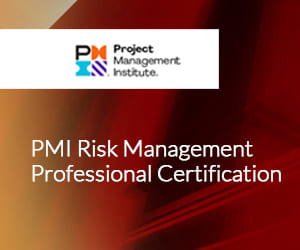The PMI Risk Management Professional (PMI-RMP) certification signifies your expertise in identifying, analyzing, managing, and mitigating risks throughout the project lifecycle. Earning this credential demonstrates your advanced knowledge and experience in this crucial field, making you a valuable asset to any project team.
The PMI Risk Management Professional (PMI-RMP) exam encompasses a broad range of topics related to identifying, analyzing, responding to, and controlling project risks. These topics are grouped into five main domains:
- Risk Strategy and Planning (15%)
- Develops the foundation for effective risk management throughout the project.
- Covers topics like:
- Defining risk management processes
- Assessing the project environment for threats and opportunities
- Establishing risk tolerances and thresholds
- Developing a risk management plan
- Risk Identification (20%)
- Focuses on various techniques for identifying potential risks that can impact the project.
- Includes topics such as:
- Using brainstorming, checklists, and other risk identification techniques
- Analyzing project documentation and stakeholder input
- Considering historical data and industry trends
- Risk Analysis (20%)
- Analyzes identified risks to determine their likelihood and impact on the project.
- Key areas include:
- Qualitative analysis: Assessing the nature and severity of risks
- Quantitative analysis: Estimating the potential cost and schedule impacts of risks
- Risk Response Planning (20%)
- Develops strategies to address identified risks.
- Covers topics like:
- Avoiding, mitigating, transferring, accepting, or exploiting risks
- Developing risk response plans for each identified risk
- Prioritizing risk responses based on impact and likelihood
- Monitor and Control Risks (25%)
- Employs strategies to monitor and control identified risks throughout the project lifecycle.
- Key areas include:
- Tracking risks through regular monitoring
- Implementing risk response plans as needed
- Communicating risks effectively to stakeholders
- Updating the risk management plan based on new information
By mastering these key topics, candidates can demonstrate their comprehensive understanding of project risk management practices and their ability to apply them effectively to ensure project success.
The PMI Risk Management Professional (PMI-RMP) certification has two main eligibility requirements:
- Educational Qualification:
- You must hold a secondary degree (high school diploma, associate’s degree, or global equivalent).
- Experience and Training:
- You need 36 months of project management experience within the last five years. At least 4,500 hours of this experience must be dedicated to leading and directing project risk management activities.
- Additionally, you must earn 30 Professional Development Units (PDUs) in project risk management. Completing relevant training courses or attending conferences can help you fulfill this requirement.
